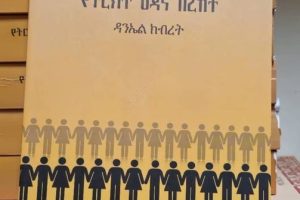
(Part II)
The semi-autobiographical novel did reveal the sympathetic nature of Zimbabweans. In the previous article, I analyzed the major character’s ( Tamb’s) systematic sympathy for peaceful association with her brother and the rest family members.
In this part, I will examine the remaining characters’ reflections on the raised issue. The analysis is mirrored through Nego Feminism.
The best example that represented no self/no ego-personality in the novel was the wife of Babamukuru, Miaguru. Babamukuru and his wife, Miaguru, had been studying for their Degree in South Africa and got an MA degree in England. But when they came back to the family of Babamukuru or Rhodesia, relatives and people around gave great respect and praise to Babamukuru. No one was greeting or even noticing Miaguru. Tambu narrated the situation as follows:
“Babamukuru stepped inside, followed by a retinue of grandfathers, uncles, and brothers. Various paternal aunts, who could be relatives of the lower strata. Maiguru entered last and alone, except for her two children, smiling quietly and inconspicuously” (Dangarembga, 1988, p. 37).
Miaguru was a quiet person who did not like to show off. She dressed decently. She had the manners of a decent lady. This could also be seen in the way she walked. She was also devoted to her husband and children. She sacrificed everything for her family. Although she was an educated woman, family members did not give her the warm welcome they had given to her husband. Since she was behaving like those who were not educated in that setting, no one was giving any regard for her. This made her to be seen like other women in the family and the society. In other words, she lived an ordinary life there peacefully.
Miaguru exposed herself when she was talking with Tambu sometime later after the above-mentioned incident. She told Tambu that she had an MA degree like her uncle. That was very unexpected for Tambu. Here is the dialogue:
“Do you have a Masters Degree?
Didn’t you know?
How could I have known? No one had ever mentioned it to me.
Did you ever ask?
Yes, we both studied, your uncle and I, in South Africa for our Bachelor’s Degree and in England for our Master’s” (Dangarembga, 1988, p. 101).
This dialogue showed that Miaguru did not reveal her educational level unless someone asked. Another incident which exhibited no ego/ no self was when Tambu asked Miaguru about the amount of money that she had been receiving when she was working in England. Tambu reminded their words as: “You must earn a lot of money, ‘I breathed in awe. My aunt laughed and said she never received her salary. I was aghast” (Dangarembga, 1988, p. 101).
This statement shows that Miaguru has been giving her money to her husband. She didn’t use it for herself. What mattered to her was just serving her husband in any way she could. This could help to build a sense of complementarity and cooperation in her family by practically showing them her devotion and love. However, marriage should be based on mutual help. In this case, it was Babamukuru who got all the benefits of marriage. In this regard, Nnaemeka (2004) asserted that when one shows more care for another than self, the other party should react that way so that the two could build mutual satisfaction. Thus, the selflessness of Miaguru was not successful in influencing the sympathy of Babamukuru. He was simply exploiting her in all aspects. Here the researcher needed to say that Miaguru was undervaluing herself for no reward from her husband. Therefore, this woman was not strategic in influencing her husband to start thinking about her and the family. She was there to be exploited and subverted by his authoritative personality. //
The other example of no ego/no self that Miaguru revealed was seen when Miaguru asked Tambu about her feelings concerning her trip to South Africa and England with her husband. Tambu replied as follows:
“I thought you went to look after Babamukuru,’ I said. ‘That’s all people ever say.’
Maiguru snorted,’ And what do you expect? Why should a woman go all that way and put up with all those problems if not to look after her husband?
Can you tell me now that they aren’t pleased that I did, even if they don’t admit it? No! your uncle wouldn’t be able to do half the things he does if I didn’t work as well.
If it was necessary to efface yourself to preserve his sense of identity and value, then, I was sure Maiguru had taken the correct decisions” (Dangarembga, 1988, p. 101- 102).
Here it is visible that the two women, Maiguru and Tambu, accepted that their femininity was all about serving their male counterparts around them: at homestead work and in bringing money too. Maiguru uncovered that the success of her husband was because of her strength in helping him work outside to bring money for the family, taking care of the children, and her husband too. She said: “Your uncle wouldn’t be able to do half the things he does if I didn’t work as well!” (Dangarembga, 1988, p. 101).
Here helping her husband to get success in his education is good, and it is an accepted and expected task of the wife. But what matters is in the process of helping this man Miaguru should not leave her own life too. Her help and cooperation should also be shared by Babamukuru in helping her back. He did not show such a reaction. He preferred to continue using her as inferior to him. Thus, she was a subordinated woman by this educated man. Therefore, this selflessness is not a strategic approach that changed the mood of Babamukuru.
For Miaguru, the well-being of her family was the most important thing than her self-interest. She knew what things she would do with the degree she held if there were not Babamukuru and her children there with her. She gave everything that she had to the family for the sake of the interest and happiness of her husband and the children. We cannot imagine the challenges she might have faced. She speaks of it as follows: “When I was in England I glimpsed for a little while the things I could have been, the things I could have done if-if-if things were-different-But there was Babawa Chido and the children and the family” (Dangarembga, 1988, p. 101).
As it is read in the above extract, Miaguru called her husband Babawa Chido which means the father of Chido, her son. This implies that she is trying her best to be strategic in approaching him with sympathy. She goes this far, the researcher understood, because this man is very strong and rigid in settling cases and relationships in the family. Miaguru said she was having an opportunity to do more when she was in England. But she prefers to leave these things for the sake of her family. This means she had made lots of sacrifices for the family and Babamukuru. She said: “does anyone appreciate, what sacrifices were made?’ ‘As for me, no one even thinks about the things I gave up” (Dangarembga, 1988, p. 102).
This extract shows that Miaguru exhibited her love for the family by paying a price. The prior thing that she worries about is her husband and her family too. Priority is given to her family, not to herself. As she testifies, Babamukuru would not have gotten his present educational and social status if she had not served him as she did. The family of Babamukuru, including the family of Tambu, got economic benefits and the present social status because of the sacrifice Maiguru had made.
The sacrifices that Miaguru experienced impressed Tambu. Instead of complaining Miaguru quietly shouldered the burden of the family by striving for their welfare. This was evidenced in the novel as:
“If it was necessary to efface yourself, as Maiguru did so well that you couldn’t be sure that she didn’t enjoy it if it was necessary to efface yourself to preserve his sense of identity and value, then I was sure, Maiguru had taken the correct decisions” (Dangarembga, 1988, p. 102).
This extract showed that Tambu had a feminine identity, and she believes in the preservation of one’s identity and value at the cost of self-sacrifices. Tambu was not only impressed by Miaguru, but she also approved of what Miaguru did. According to Tambu, Miaguru is a woman who strives for the welfare and social change of the family. For Tambu Miaguru was right in serving her husband that way. This complementarity helps the two sexes to live peacefully as a family. However, the researcher feels differently. The life of Miaguru was full of commitment and scarification. This scarification helped Babamukuru to achieve his own goal. However, he did not realize that caring for his wife is also important for her to achieve her own goal. He never showed this attempt in the novel. Thus, Tambu was not the right girl to see this fact logically. Second Tambu seemed biased for her uncle. If she had not been such a girl, she would have understood the subordination of Miaguru even after those troubles. Therefore, Miaguru could not be a sample woman in the family and in the society that portrayed strategic sympathy in her life.
BY: MEKDES TAYE (PHD)
THE ETHIOPIAN HERALD THURSDAY 1 AUGUST 2024





